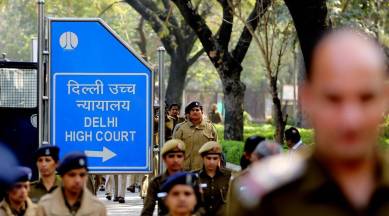Stay updated with the latest - Click here to follow us on Instagram
Jamia violence case: ‘Ajmal Kasab had a conscience too’, Delhi Police objects to court’s reasoning on dissent
Refusing to expunge the trial court’s remarks at this stage, the HC noted that the next date of the trial was in April, and no interim orders were required. The police’s plea is listed for next hearing on March 16.

The Delhi High Court Monday stated that the observations against Delhi Police by a trial court while discharging Sharjeel Imam and others in the Jamia violence case would not affect either the investigation or the trial of any accused.
A single-judge bench of Justice Swarana Kanta Sharma, while issuing notice to Imam, Asif Iqbal Tanha, Safoora Zargar and eight others, seeking their response on the police’s revision plea against the discharge order, stated, “Since further investigation will be carried out, observations made against investigation agency will not affect either further investigation or trial of any accused.”
monthly limit of free stories.
with an Express account.
Refusing to expunge the trial court’s remarks at this stage, the HC noted that the next date of the trial was in April, and no interim orders were required. The police’s plea is listed for next hearing on March 16.
Appearing for police, Additional Solicitor General Sanjay Jain submitted that the offence was of “riot and unlawful assembly” and the trial court in its February 4 order “conceded that these people were not onlookers or curious bystanders but were part of protests” and that whether these people were part of the protest would emerge in trial.
Jain argued that the Forensic Science Lab (FSL) report had not been received despite this the trial court passed the order discharging the accused.
Questioning the trial court’s observations on dissent as “reflective of something which pricks a citizen’s conscience”, Jain argued, “The question is am I governed by law or conscience. Even a dacoit may have a conscience. Even Ajmal Kasab had a conscience. He believed in what he was doing.”
The trial court had invoked Gandhi and observed, “Consci-ence is the source of dissent, asserts Gandhi. When something is repugnant to our conscience, we refuse to obey it. This disobedience is constituted by duty. It becomes our duty to disobey anything that is repugnant to our conscience.”
Jain questioned the trial court’s reasoning rejecting the police case on grounds that they did not take permission to file a third supplementary charge-sheet.
“A chargesheet is a document with a statutory cloak and cannot be disregarded at the whims and fancies of the judge. Investigation is a dynamic process. In a rioting case, it is inevitable that the investigation may take time,” Jain argued, adding that Only re-investigation requires permission, and not further investigation.
Jain said, “Are these conclusions permissible in an order of discharge? Is the trial court hearing a PIL or is he examining a constitutional issue? If they created havoc, do I need to prove anything further for an unlawful assembly? If something is havoc or mayhem, is it a good thing for society?”
Jain said the observations of the trial court “are going to adversely affect” or be “detrimental” to further investigation. He submitted that he was not seeking a complete stay but only a stay on the observations made against his client: “Clarification is necessary. Otherwise without that, these observations will continue to haunt me. Your lordship may clarify that investigation and further chargesheet will remain uninfluenced, and that this order may not be relied on in any proceedings.”
On the other hand, Asif Iqbal Tanha’s counsel argued that the “observations are necessary for the kind of prosecution this case has been”. It was argued that the trial court had considered the law on “mere presence” in protests. On stay/partial stay, it was argued that police can do further probe. Tanha’s counsel said another person, Mohd Illyas, may be impleaded in the first instance as he has a right to be heard. The trial had gone ahead and framed charges against Mohd Illyas.
The High Court observed that it was not going to expunge remarks of the trial court right now. However, it noted that Jain’s arguments had a point, that the remarks were going to influence investigation. Justice Sharma said, “I cannot interfere in the investigation. I am only going to say observations made against the investigating agency will not influence them at all.”
Police, in their revision plea, have sought setting aside of the order of additional sessions judge Arul Varma of Saket courts that discharged Imam and others in the case, alleging that the trial court was “also swayed by emotional and sentimental feelings”.